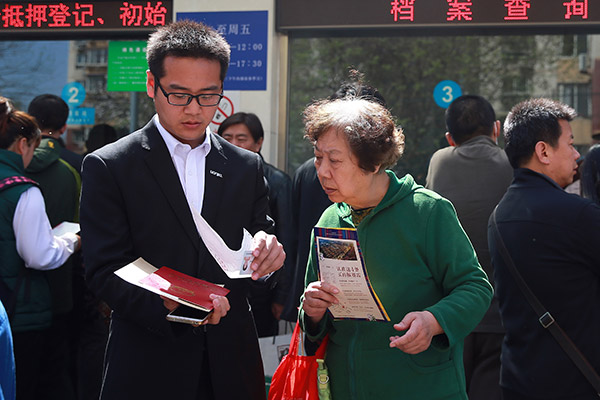Beijing property curbs to cool preowned market
 |
|
A housing agent helps a client complete property transactions in Beijing. [Photo/China Daily] |
The newly released property purchasing policy in Beijing is likely to cause terminations on existing contracts and help cool down the capital's property market, according to industry insiders.
Under the new policy, buyers who own a property in Beijing or have loan records in or outside the capital, will face an increased down payment if they want to move home or buy second properties in the city.
"The regulation will have a more direct and obvious effect on the preowned property market," Ren Qixin, deputy general manager of Yahao Real Estate, was quoted by Beijing Daily as saying. "On Saturday, the second day after the policy took effect, only 224 preowned properties were sold, while during the previous five days, the number remained at about 1,000 every day," Ren said.
He said under the new policy, buyers looking to trade their current houses for another one need to pay at least 80 percent of the down payment for property valued at more than 4.68 million yuan ($682,000), while most Beijing properties are valued at a higher price.
"The average price of a Beijing property is 6 million yuan per unit, which means most houses are above 4.68 million," said Zhang Dawei, an analyst at Centaline Property.
The policy raises the possibility that buyers could withdraw from contracts due to the financial pressure of meeting the down payment.
"The deleveraging effect was obvious. Most preowned property buyers will have to pay 80 percent as down payment," said Ren. "It will cool down the preowned market, and slow down the sell-one-and-buy-another situation."
Hu Jinghui, vice-president of real estate agency 5i5j, also expected a fall in market demand.
"With reducing demand, we hope to see housing prices fall," Hu said.
However, if buyers terminate previously agreed contracts, it will not count as a breach, said Zhang Nan, a lawyer from Zhong Yin Law Firm.
Even after the contract is validated, if either of the party needs to terminate because of the policy, they should not be liable for the termination unless it is especially noted in the contract.
"The seller will have to return the payment or deposit, and neither party should be fined for the termination," said Zhang.























